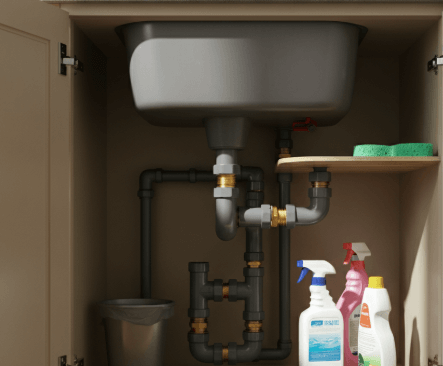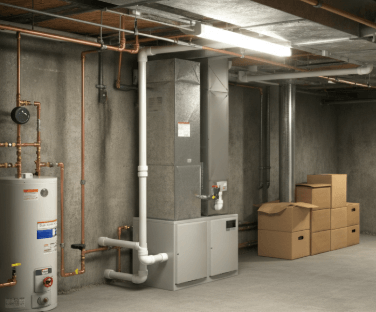It might seem challenging to sell a house with polybutylene pipes in Port Charlotte, FL, but it’s absolutely possible with the right strategy. Did you know that polybutylene pipes were installed in up to 10 million homes in the US before being discontinued due to frequent leaks and failures? Homes with these pipes can experience reduced market value, delayed sales, or even insurance complications. Fortunately, seasoned experts like Steve Daria and Joleigh, acclaimed real estate investors with expertise in cash home buying, are here to guide you through the process with ease. With their deep understanding of the local market, they can recommend tailored solutions to help you sell your property efficiently, even if it has polybutylene pipes. Whether it’s addressing buyer concerns or advising on repairs, their expertise makes selling seamless and stress-free. Don’t wait for unforeseen plumbing issues to impact your sale. If you’re ready to sell a house with polybutylene pipes in Port Charlotte, FL, book a free discussion with Steve and Joleigh today for tailored advice and a smooth transaction.
Key Points
- Polybutylene Pipes Can Impact Home Value and Insurance: Polybutylene pipes often reduce a home’s value and might lead to higher insurance premiums or policy cancellations. These factors can make selling your home trickier.
- Leaking Risks Create Buyer Concerns: Polybutylene pipes are prone to leaks, sometimes occurring without warning. This can cause water damage and raise red flags for potential buyers.
- Local Experts Can Simplify the Process: Working with experienced local investors like Steve Daria and Joleigh can help you sell smoothly. They specialize in buying homes for cash, even with piping issues.
- Possible Solutions to Increase Appeal: Homeowners can opt to replace polybutylene pipes to increase property appeal. Repairs may make buyers feel more confident about the home’s reliability.
- Selling ‘As-Is’ is Still an Option: If replacing pipes isn’t feasible, you can still sell your house in its current condition. Investors offering cash purchases eliminate the need for renovations upfront.
What are polybutylene pipes, and why were they used?
Polybutylene pipes, a type of plastic plumbing material, were commonly installed in homes constructed between 1978 and 1995.
These pipes were popular due to their low cost, lightweight nature, and ease of installation.
Homebuilders saw them as a revolutionary alternative to more expensive piping materials like copper.
However, over time, it was discovered that polybutylene pipes could degrade when exposed to certain chemicals in public water systems, leading to leaks and pipe failures.

These issues often occur without warning, causing significant water damage inside homes.
Because of their high failure rate, polybutylene pipes are no longer used today and are considered a significant defect in real estate.
Homeowners looking to sell a house with polybutylene pipes in Port Charlotte, FL, may face unique challenges, such as reduced home value and buyer concerns.
Understanding these pipes’ history and potential risks can help sellers prepare for the process effectively.
Get An Offer Today, Sell In A Matter Of Days…
How can polybutylene pipes affect my home sale in Port Charlotte, Florida?
Polybutylene pipes can significantly impact your home sale in several ways.
These pipes are known for their high failure rate, which can worry potential buyers who fear future plumbing issues and costly repairs.
Homes with polybutylene pipes are often seen as less valuable, leading to lower market price offers.
Insurance companies may also hesitate to provide coverage or charge higher premiums, discouraging buyers.
Some buyers might request that the pipes be replaced as a condition of purchase, which can delay the sale and add to your costs.
On the other hand, selling the property as-is might still attract cash buyers or investors willing to handle the plumbing upgrades themselves.
If you aim to sell a house with polybutylene pipes in Port Charlotte, FL, it’s important to be upfront about the issue and prepared to negotiate.
Transparency and proper preparation can help you handle this challenge while still closing the deal successfully.
What are the costs of replacing polybutylene pipes?
- Material Costs: Replacing polybutylene pipes typically requires using modern materials like PEX or copper. The cost of these materials varies by type, typically ranging between $1 and $4 per linear foot.
- Labor Charges: Professional plumbers usually charge between $50 and $200 per hour for their work. The total labor cost depends on your home’s size and the job’s complexity.
- Home Size and Layout: The cost to replace pipes can range from $1,500 in smaller homes to over $15,000 in larger ones. Factors like the number of bathrooms, the accessibility of pipes, and the home’s layout can influence the final price.
- Additional Repairs: Removing old pipes might require cutting into walls, ceilings, or floors, which means extra repair costs. Patching drywall or replacing tiles could add several hundred dollars or more to your total expenses.
- Permits and Inspections: Depending on local regulations, you may need a permit to start the plumbing work, which can cost between $50 and $500. After the work is done, an inspection might be required to ensure everything complies with codes, adding another small fee to the overall cost.

Are there alternatives to replacing polybutylene pipes?
If you’re not ready to replace polybutylene pipes, consider a few alternatives.
An effective solution is to apply a protective coating to the interior of existing pipes, helping to reduce deterioration and extend their lifespan, but this is a temporary fix and doesn’t guarantee long-term reliability.
Routine inspections and maintenance are essential for detecting leaks early, enabling you to resolve minor issues before they escalate into significant problems.
Some homeowners choose to disclose the pipes’ condition upfront and offer a home warranty to ease buyers’ concerns about potential plumbing troubles.
You could even negotiate a lower asking price to account for expected repairs, making your home more appealing to buyers.
Another approach is targeting cash buyers or investors who are more likely to accept the pipes as is.
However, keep in mind that doing nothing also comes with risks, as pipe failure can cause significant water damage.
If you’re trying to sell a house with polybutylene pipes in Port Charlotte, FL, carefully weighing these alternatives can help you decide the best path forward.
What factors should I consider when pricing a home with polybutylene pipes?
- The Cost of Replacing the Pipes: Even if you’re not replacing the pipes, buyers may factor this cost into their offer. Research the typical replacement costs for homes similar to yours to set a realistic price.
- Impact on Home Value: Buyers often consider homes with polybutylene pipes less valuable. Be ready to adjust your asking price to reflect the reduced market demand for homes with aging or problematic plumbing systems.
- Buyer Concerns: Consider how the pipes will affect a buyer’s willingness to purchase your home. Some buyers hesitate, while others insist on repairs before closing, impacting both the price and the timeline.
- Condition of the Pipes: If your polybutylene pipes are well-maintained without frequent leaks, this could appeal to buyers. Highlighting their current condition can help justify your pricing to potential buyers.
- Competitive Pricing in Your Area: Research homes in your area with similar issues to see how they are priced. Competitive pricing can attract more buyers, even if your home has polybutylene pipes, making negotiating and closing a sale easier.
- Availability of Home Warranties: Offering a home warranty that covers plumbing issues can ease buyer anxiety. This small investment might help reassure buyers and make your home more appealing.
- Local Market Conditions: The real estate market in your area can influence how much buyers are willing to overlook potential pipe problems. If it’s a seller’s market, you may not need as many concessions, but competitive pricing becomes more important in a buyer’s market.
What documents should I prepare for selling a home with polybutylene pipes in Port Charlotte, Florida?
When you decide to sell a house with polybutylene pipes in Port Charlotte, FL, being prepared with the necessary documents can streamline the process.
Start by gathering past inspection reports detailing the pipes’ condition, as buyers will want transparency about potential issues.
It’s also helpful to provide receipts for repairs or maintenance done on the plumbing system to show the steps you’ve taken to care for the home.
A disclosure form is crucial, as it informs buyers about the existence of polybutylene pipes and avoids potential legal issues later.
If you’ve obtained any estimates for replacing the pipes, include those as well, as they can help buyers understand the associated costs.
Additionally, prepare your home warranty documents if you offer one to cover potential plumbing troubles.
Don’t forget general property documents like the title deed, property tax records, and HVAC service records to present a complete picture of your property’s condition.
For guidance or a cash offer, contact Steve Daria and Joleigh, expert real estate investors and seasoned house buyers, to make your selling experience easier.
**NOTICE: Please note that the content presented in this post is intended solely for informational and educational purposes. It should not be construed as legal or financial advice or relied upon as a replacement for consultation with a qualified attorney or CPA. For specific guidance on legal or financial matters, readers are encouraged to seek professional assistance from an attorney, CPA, or other appropriate professional regarding the subject matter.

